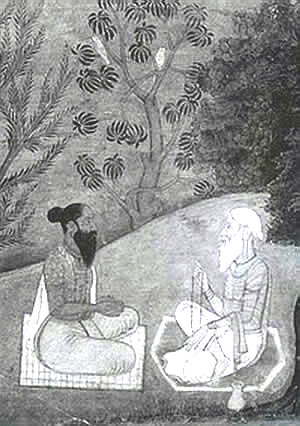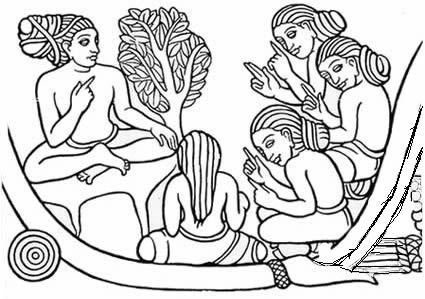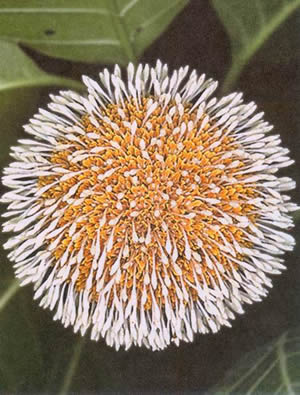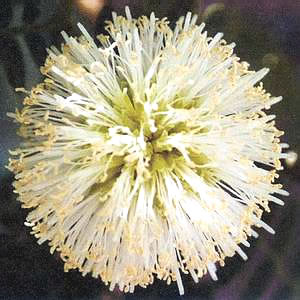Taittiriya Upanishad - Text in Sanskrit with translation into English
Taittiriya Upanishad
Text in Sanskrit with translation into English
by Sri Aurobindo
SHIKSHAVALLI
Chapter One
हरिः ॐ | | शं नो मित्रः शं वरुणः | शं नो भवत्वर्यमा |
शं न इन्द्रो बृहस्पतिः | शं नो विष्णुरुरुक्रमः | |
नमो ब्रह्माणे | |नमस्ते वायो | त्वमेव प्रत्यक्षं ब्रह्मासि |
त्वामेव प्रत्यक्षं ब्रह्म वदिष्यामि | ऋतं वदिष्यामि |
सत्यं वदिष्यामि | तन्मामवतु | तदुक्तारमवतु | अवतु माम् |
अवतु वक्तारम् | ॐ शान्तिः शान्तिः शान्तिः | |
Hari OM. Be peace to us Mitra. Be peace to us Varuna. Be peace to us Aryaman, Be peace to us Indra and Brihaspati. May far-striding Vishnu be peace to us. Adoration to the Eternal. Adoration to thee, O Vayu. Thou, thou art the visible Eternal and as the visible Eternal I will declare thee. I will declare Righteousness! I will declare Truth! May that protect me! May that protect the speaker! Yea, may it protect me! May it protect the speaker. OM! Peace! Peace! Peace!
Chapter Two
ॐ शीक्षां व्याख्यास्यामः । वर्णः स्वरः । मात्रा बलम् । साम संतानः । इत्युक्तः शीक्षाध्यायः ॥
OM. We will expound Shiksha, the elements. Syllable and Accent, Pitch and Effort, Even Tone and Continuity; in these six we have declared the chapter of the elements.
Chapter Three
सह नौ यशः । सह नौ ब्रह्मवर्चसम् । अथातः संहिताया उपनिषदं व्याख्यास्यामः । पञ्चस्वधिकरणेषु । अधिलोकमधिज्यौतिषमधिविद्यमधिप्रजमध्यात्मम् । ता महसंहिता इत्याचक्षते ।
अथाधिलोकम् । पृथिवी पूर्वरुपम् । द्यौरुत्तररुपम् । आकाशः संधिः । वायुः संधानम् । इत्यधिलोकम् ।
अथाधिज्यौतिषम् । अग्निः पूर्वरुपम् । आदित्य उत्तररुपम् । आपः संधिः । वैद्युतः सन्धानम् । इत्यधिज्यौतिषम् ।
अथाधिविद्यम् । आचार्यः पूर्वरुपम् । अन्तेवास्युत्तररुपम् । विद्या सन्धिः । प्रवचनं संधानम् । इत्यधिविद्यम् ।
अथाधिप्रजम् । माता पूर्वरुपम् । पितोत्तररुपम् । प्रजा संधिः । प्रजननं संधानम् । इत्यधिप्रजम् ।
अथाध्यात्मम् । अधरा हनुः पूर्वरुपम् । उत्तरा हनुरुत्तररुपम् । वाक् संधिः । जिह्वा संधानम् । इत्यध्यात्मम् ।
इतीमा महासंहिताः । य एवमेता महासंहिता व्याख्याता वेद । संधीयते प्रजया पशुभिः । ब्रह्मवर्चसेनान्नाद्येन सुवर्ग्येण लोकेन ॥
Together may we attain glory, together to the radiance of holiness. Hereupon we will expound next the secret meaning of Sanhita whereof there are five capitals. Concerning the Worlds: Concerning the Shining Fires; Concerning the Knowledge: Concerning Progeny: Concerning Self. These are called the great Sanhitas.
Now concerning the Worlds. Earth is the first form, the heavens are the second form; ether is the linking; air is joint of the linking. Thus far concerning the Worlds.
Next concerning the Shining Fires, Fire is the first form, the Sun is the latter form; the waters are the linking; electricity is the joint of the linking. Thus far concerning the Shining Fires.
Next concerning the Knowledge. The Master is the first form, the disciple is the latter form. Knowledge is the linking. Exposition is the joint of the linking. Thus far concerning the Knowledge.
Next concerning Progeny. The mother is the first form; the father is the latter form. Progeny is the linking, act of procreation is the joint of the linking. Thus far concerning Progeny.
Next concerning Self. The upper jaw is the first form; the lower jaw is the latter form; speech is the linking; the tongue is the joint of the linking. Thus far concerning Self.
These are the great Sanhitas. He who knows thus the great Sanhitas as we have expounded them, to him are linked progeny and wealth of cattle and the radiance of holiness and food and all that is of food and the world of his high estate in heaven.

यश्छन्दसामृषभो विश्वरुपः । छन्दोभ्योऽध्यमृतात्सम्बभूव । स मेन्द्रो मेधया स्पृणोतु । अमृतस्य देव धारणो भूयासम् । शरीरं मे विचर्षणम् । जिह्वा मे मधुमत्तमा । कर्णाभ्यां भूरि विश्रुवम् । ब्रह्मणः कोशोऽसि मेधया पिहितः । श्रुतं मे गोपाय ।
आवहन्ती वितन्वाना । कुर्वाणा चीरमात्मनः । वासांसि मम गावश्च । अन्नपाने च सर्वदा । ततो मे श्रियमावह । लोमशां पशुभिः सह स्वाहा ।
आ मा यन्तु ब्रह्मचारिणः स्वाहा ।
वि मायन्तु ब्रह्मचारिणः स्वाहा ।
प्र मायन्तु ब्रह्मचारिणः स्वाहा ।
दमायन्तु ब्रह्मचारिणः स्वाहा ।
शमायन्तु ब्रह्मचारिणः स्वाहा ।
यशो जनेऽसानि स्वाहा ।
श्रेयान् वस्यसोऽसानि स्वाहा ।
तं त्वा भग प्रविशानि स्वाहा ।
स मा भग प्रविश स्वाहा ।
तस्मिन् सहस्त्रशाखे । नि भगाहं त्वयि मृजे स्वाहा ।
यथापः प्रवता यन्ति । यथा मासा अहर्जरम् । एवं मां ब्रह्मचारिणोः धातरायन्तु सर्वतः स्वाहा ।
प्रतिवेशोऽसि । प्र मा भाहि । प्र मा पद्यस्व ॥
The bull of the hymns of Veda whose visible form is all this Universe he above the vedas who sprang from that which is deathless, may Indra increase unto me intellect for my strengthening. O God, may I become a vessel of immortality. May my
body be swift to all works, may my tongue drop pure honey. May I hear vast and manifold lore with my ears. O Indra, thou art the sheath of the Eternal and the veil that the workings of brain have drawn over Him; preserve whole unto me the sacred lore that I have studied.
She brings unto me wealth and extends it, yea, she makes speedily my own raiment and cattle and drink and food now and always; therefore carry to me Fortune of much fleecy wealth and cattle with her. Swaha!
May the Brahmacharins come unto me. Swaha!
From here and there may the Brahmacharins come unto me. Swaha!
May the Brahmacharins set forth unto me. Swaha!
May the Brahmacharins attain self-mastery. Swaha!
May the Brahmacharins attain to peace of soul. Swaha!
May I be a name among the folk! Swaha!
May I be the first of the wealthy! Swaha!
O Glorious Lord, into that which is thou may I enter. Swaha!
Do thou also enter into me, O shining One. Swaha!
Thou art a river with a hundred branching streams, O Lord of Grace, in thee may I wash me clean. Swaha!
As the waters of a river pour down the steep, as the months of the year hasten to the old age of days, O Lord that cherisheth, so may the Brahmacharins come to me from all the regions. Swaha!
O Lord, thou art my neighbour, thou dwellest very near me. Come to me, be my light and sun.

 Hermitages in Bharhut sculptures (c. 2nd century B.C)
Hermitages in Bharhut sculptures (c. 2nd century B.C)
Chapter Five
भूर्भुवः सुवरिति वा एतास्तिस्त्रो व्याहृतयः । तासामु ह स्मैतां चतुर्थीम् । माहाचमस्यः प्रवेदयते । मह इति । तद् ब्रह्म । स आत्मा । अङ्गान्यन्या देवताः ।
भूरिति वा अयं लोकः । भुव इत्यन्तरिक्षम् । सुवरित्यसौ लोकः । मह इत्यादित्यः । आदित्येन वाव सर्वे लोका महीयन्ते ।
भूरिति वा अग्निः । भुव इति वायुः । सुवरित्यादित्यः । मह इति चन्द्रमाः । चन्द्रमसा वाव सर्वाणि ज्योतींषि महीयन्ते ।
भूरिति वा ऋचः । भुव इति सामानि । सुवरिति यजूंषि । मह इति ब्रह्म । ब्रह्मणा वाव सर्वे वेदा महीयन्ते ।
भूरिति वै प्राणः । भुव इत्यपानः । सुवरिति व्यानः । मह इत्यन्नम् । अन्नेन वाव सर्वे प्राणा महीयन्ते ।
ता वा एताश्चतस्त्रश्चतुर्धा । चतस्त्रश्चतस्त्रो व्याहृतयः । ता यो वेद । स वेद ब्रह्म । सर्वेऽस्मै देवा बलिमावहन्ति ॥
Bhur, Bhuvar and Suvar, these are the three Words of His naming. Verily, the Rishi Mahachamasya made known a fourth to these, which is Mahas. It is Brahman, it is the Self, and the other gods are his members.
Bhur, it is this world; Bhuvar, it is the sky; Suvar, it is the other world: but Mahas is the Sun. By the Sun all these worlds increase and prosper.
Bhur, it is Fire; Bhuvar, it is Air; Suvar, it is the Sun; but Mahas is the Moon. By the Moon all these lights of heaven¹ increase and prosper.
Bhur, it is the hymns of the Rig-veda; Bhuvar, it is the

Anthocephalus Cadamba (Supramental Sun)
hymns of the Sama; Suvar, it is the hymns of the Yajur; but Mahas is the Eternal. By the Eternal all these Vedas increase and prosper.
Bhur, it is the main breath; Bhuvar, it is the lower breath; Suvar, it is the breath pervasor; but Mahas is food. By food all these breaths increase and prosper.
These are the four and they are fourfold; — four Words of His naming and each is four again. He who knows these knows the Eternal, and to him all the Gods carry the offering.
Chapter Six
स य एषोन्तर्हृदय आकाशः । तस्मिन्नयं पुरुषो मनोमयः । अमृतो हिरण्मयः । अन्तरेण तालुके । य एष स्तन इवावलम्बते । सेन्द्रयोनिः । यत्रासौ केशान्तो विवर्तते । व्यपोह्य शीर्षकपाले ।
भूरित्यग्नौ प्रतितिष्ठति । भुव इति वायौ । सुवरित्यादित्ये । मह इति ब्रह्मणि । आप्नोति स्वाराज्यम् । आप्नोति मनसस्पतिम् । वाक्पतिश्चक्षुष्पतिः । श्रोत्रपतिर्विज्ञानपतिः । एतत्ततो भवति । आकाशशरीरं ब्रह्म । स्तायत्म प्राणारामं मनआनन्दम् । शान्तिसमृद्धममृतम् । इति प्राचीनयोग्योपास्स्व ॥
Lo, this heaven of ether which is in the heart within, there dwells the Being who is all Mind, the radiant and golden Immortal. Between the two palates, this that hangs down like the breast of a woman, is the womb of Indra; yea, where the hair at its end whirls round like an eddy, there it divides the skull and pushes through it.
As Bhur He is established in Agni, as Bhuvar in Vayu, as Suvar in the Sun, as Mahas in the Eternal. He attains to the kingdom
of Himself; He attains to the Lord of Mind; He becomes Lord of Speech, Lord of Sight, Lord of Hearing, Lord of the Knowledge. Thereafter this too He becomes, — the Eternal whose body is all ethereal space, whose soul is Truth, whose bliss is in Mind, who takes His ease in Prana, the Rich in Peace, the Immortal. As such, O son of the ancient Yoga, do thou adore Him.
Chapter Seven
पृथिव्यन्तरिक्षं द्यौर्दिशोऽवान्तरदिशः । अग्निर्वायुरादित्यश्चन्द्रमा नक्षत्राणि । आप ओषधयो वनस्पतय आकाश आत्मा । इत्यधिभूतम् ।
अथाध्यात्मम् । प्राणो व्यानोऽपान उदानः समानः । चक्षुः श्रोत्रं मनो वाक् त्वक् । चर्म मांसं स्नावास्थि मज्जा । एतदधिविधाय ऋषिरवोचत् । पाङक्तं वा इदं सर्वम् । पाङ्क्तेनैव पाङ्क्तं स्पृणोतीति ॥
Earth, sky, heaven, the quarters and the lesser quarters; Fire, Air, Sun, Moon and the Constellations; Waters, herbs of healing, trees of the forest, ether and the Self in all; these three concerning this outer creation.
Then concerning the Self. The main breath, the middle breath, the nether breath, the upper breath and the breath pervasor;
Eye, ear, mind, speech and the skin; hide, flesh, muscle, bone and marrow. Thus the Rishi divided them and said, "In sets of five is this universe; five and five with five and five He relates."
Chapter Eight
ओमिति ब्रह्म । ओमितीदं सर्वम् । ओमित्येतदनुकृतिर्ह स्म वा अप्यो श्रावयेत्याश्रावयन्ति । ओमिति सामानि गायन्ति । ओं शोमिति शस्त्राणि शंसन्ति । ओमित्यघ्वर्युः प्रतिगरं प्रतिगृणाति । ओमिति ब्रह्मा प्रसौति । ओमित्यग्निहोत्रमनुजानाति । ओमिति ब्राह्मणः प्रवक्ष्यन्नाह ब्रह्मोपाप्नवानीति । ब्रह्मैवोपाप्नोति ॥
OM is the Eternal, OM is all this universe. OM is the syllable of assent: saying, OM ! let us hear,' they begin the citation. With OM they sing the hymns of the Sama; with OM SHOM they pronounce the Shastra. With OM the priest officiating at the sacrifice says the response. With OM Brahma begins creation.¹ With OM one sanctions the burnt offering. With OM the Brahmin ere he expound the Knowledge, cries "May I attain the Eternal." The Eternal verily he attains.
Chapter Nine
ऋतं च स्वाध्यायप्रवचने च । सत्यं च स्वाध्यायप्रवचने च । तपश्च स्वाध्यायप्रवचने च । दमश्च स्वाध्यायप्रवचने च । शमश्च स्वाध्यायप्रवचने च । अग्नयश्च स्वाध्यायप्रवचने च । अग्निहोत्रं च स्वाध्यायप्रवचने च । अतिथयश्च स्वाध्यायप्रवचने च । मानुषं च स्वाध्यायप्रवचने च । प्रजा च स्वाध्यायप्रवचने च । प्रजनश्च स्वाध्यायप्रवचने च । प्रजातिश्च स्वाध्यायप्रवचने च । सत्यमिति सत्यवचा राथीतरः । तप इति तपोनित्यः पौरुशिष्टिः । स्वाध्यायप्रवचने एवेति नाको मौद्गल्यः । तद्धि तपस्तद्धि तपः ॥
¹.Or, With OM the chief priest gives sanction.
Righteousness with the study and teaching of Veda; Truth with the study and teaching of Veda; askesis with the study and teaching of Veda; self-mastery with the study and teaching of Veda. Peace of soul with the study and teaching of Veda. The household fires with the study and teaching of Veda. The burnt offering with the study and teaching of Veda. Progeny with the study and teaching of Veda. Joy of thy child's mother¹ with the study and teaching of Veda. Children of thy children with the study and teaching of Veda — these duties. "Truth is first," said the truth-speaker, the Rishi, son of Rathitara. "Askesis is first," said the constant in austerity, the Rishi, son of Purushishta. "Study and teaching of Veda is first," said Naka, son of Mudgala. For this too is austerity and this too is askesis,
Chapter Ten
अहं वृक्षस्य रेरिवा । कीर्तिः पृष्ठं गिरेरिव । ऊर्ध्वपवित्रो वाजिनीव स्वमृतमस्मि । द्रविणं सवर्चसम् । सुमेधा अमृतोक्षितः । इति त्रिशङ्कोर्वेदानुवचनम् ।
"I am He that moves the Tree of the Universe and my glory is like the shoulders of a high-mountain. I am lofty and pure like sweet nectar in the strong, I am the shining riches of the world, I am the deep thinker, the deathless One who decays not from the beginning." This is Trishanku's voicing of Veda and the hymn of his self-knowledge.
¹.Or, act of procreation
वेदमनूच्याचार्योऽन्तेवासिनमनुशास्ति ।
सत्यं वद । धर्मं चर । स्वाध्यायान्मा प्रमदः ।
आचार्याय प्रियं धनमाहृत्य प्रजातन्तुं मा व्यवच्छेत्सीः ।
सत्यान्न प्रमदितव्यम् । धर्मान्न प्रमदितव्यम् । कुशलान्न प्रमदितव्यम् । भूत्यै न प्रमदितव्यम् । स्वाध्यायप्रवचनाभ्यां न प्रमदितव्यम् ।
देवपितृकार्याभ्यां न प्रमदितव्यम् । मातृदेवो भव । पितृदेवो भव । आचार्यदेवो भव । अतिथिदेवो भव । यान्यनवद्यानि कर्माणि । तानि सेवितव्यानि । नो इतराणि । यान्यस्माकं सुचरितानि । तानि त्वयोपास्यानि । नो इतराणि ।
ये के चास्मच्छ्रेयांसो ब्राह्मणाः । तेषां त्वयासनेन प्रश्वसितव्यम् । श्रद्धया देयम् । अश्रद्धयाऽदेयम् । श्रिया देयम् । ह्रिया देयम् । भिया देयम् । संविदा देयम् । अथ यदि ते कर्मविचिकित्सा वा वृत्तविचिकित्सा वा स्यात् । ये तत्र ब्राह्मणाः संमर्शिनः । युक्ता आयुक्ताः । अलूक्षा धर्मकामाः स्युः । यथा ते तत्र वर्तेरन् । तथा तत्र वर्तेथाः । अथाभ्याख्यातेषु । ये तत्र ब्राह्मणाः संमर्शिनः । युक्ता आयुक्ताः । अलूक्षा धर्मकामाः स्युः । यथा ते तेषु वर्तेरन् । तथा तेषु वर्तेथाः ।
एष आदेशः । एष उपदेशः । एषा वेदोपनिषत् । एतदनुशासनम् । एवमुपासितव्यम् । एवमु चैतदुपास्यम् ॥
When the Master has declared Veda, then he gives the commandments to his disciple.
Speak truth, walk in the way of thy duty, neglect not the study of Veda. When thou hast brought to the Master the wealth
that he desires, thou shalt not cut short the long thread of thy race. Thou shalt not be negligent of truth; thou shalt not be negligent of thy duty, thou shalt not be negligent of welfare; thou shalt not be negligent towards thy increase and thy thriving; thou shalt not be negligent of the study and teaching of Veda.
Thou shalt not be negligent of thy works unto the Gods or thy works unto the Fathers. Let thy father be unto thee as thy God and thy mother as thy Goddess whom thou adorest. Serve the Master as a God and as a God the stranger within thy dwelling. The works that are without blame before the people, thou shalt do these with diligence and no others. The deeds we have done that are good and righteous, thou shalt practise these as a religion and no others.
Whosoever are better and nobler than we among the Brahmins, thou shalt refresh with a seat to honour them. Thou shalt give with faith and reverence; without faith thou shalt not give. Thou shalt give with shame, thou shalt give with fear; thou shalt give with fellow-feeling.
Moreover if thou doubt of thy course or of thy action, then to whatsoever Brahmins be there who are careful thinkers, devout, not moved by others, lovers of virtue, not severe or cruel, even as they do in that thing, so do thou. Then as to men accused and arraigned by their fellows, whatsoever Brahmins be there who are careful thinkers, devout, not moved by others, lovers of virtue, not severe or cruel, even as they are towards these so be thou.
This is the law and the teaching. These are the Commandments. In such wise shalt thou practise religion yea, verily, in such wise do ever religiously.

शं नो मित्रः शं वरुणः । शं नो भवत्वर्यमा । शं न इन्द्रो बृहस्पतिः । शं नो विष्णुरुरुक्रमः । नमो ब्रह्मणे । नमस्ते वायो । त्वमेव प्रत्यक्षं ब्रह्मासि । त्वामेव प्रत्यक्षं ब्रह्मावादिषम् । ऋतमवादिषम् । सत्यमवादिषम् ।तन्मामावीत् । तद्वक्तारमावीत् । आवीन्माम् । आवीद्वक्तारम् । ॐ शान्तिः शान्तिः शान्तिः॥
Be peace to us Mitra. Be peace to us Varuna. Be peace to us Aryaman. Be peace to us Indra and Brihaspati. May far-striding Vishnu be peace to us. Adoration to the Eternal. Adoration to thee, O Vaiou. Thou, thou art the visible Eternal & as the visible Eternal I have declared thee. I have declared Righteousness; I have declared Truth. That has protected me. That has protected the Speaker. Yea, it protected me; it protected the Speaker. OM! Peace! Peace! Peace!

BRAHMANDAVALLI
Chapter One
हरिः ॐ । सह नाववतु । सह नौ भुनक्तु । सह वीर्यं करवावहै । तेजस्वि नावधीतमस्तु मा विद्विषावहै । ॐ शान्तिः शान्तिः शान्तिः ॥
ॐ ब्रह्मविदाप्नोति परम् । तदेषाभ्युक्ता । सत्यं ज्ञानमनन्तं ब्रह्म । यो वेद निहितं गुहायां परमे व्योमन् । सोऽश्नुते सर्वान्कामान् । सह ब्रह्मणा विपश्चितेति ।
तस्माद्वा एतस्मादात्मन आकाशः सम्भूतः । आकाशाद् वायुः । वायोरग्निः । अग्नेरापः । अद्भ्यः पृथिवी । पृथिव्या ओषधयः । ओषधीभ्योऽन्नम् । अन्नात्पुरुषः । स वा एष पुरुषोऽन्नरसमयः । तस्येदमेव शिरः । अयं दक्षिणः पक्षः । अयमुत्तरः पक्षः । अयमात्मा । इदं पुच्छं प्रतिष्ठा । तदप्येष श्लोको भवति ॥
Hari OM. Together may He protect us, together may He possess us, together may we make unto us strength and virility. May our study be full to us of light and power. May we never hate. OM! Peace! Peace! Peace!
OM. The knower of Brahman attains the Highest; for this is the verse that was declared of old, "Brahman is Truth, Brahman is Knowledge, Brahman is the Infinite, he finds Him hidden in the cavern heart of being; in the highest heaven of His creatures, lo, he enjoys all desire and he abides with the Eternal, ever with that cognisant and understanding Spirit."
This is the Self, the Spirit, and from the Spirit ether was born; and from the ether, air; and from the air, fire; and from the fire, the waters; and from the waters, earth; and from the
earth, herbs and plants; and from the herbs and plants, food; and from food man was born. Verily, man, this human being, is made of the essential substance of food. And this that we see is the head of him, and this is his right side and this is his left; and this is his spirit and the self of him; and this is his lower member whereon he rests abidingly. Whereof this is the Scripture.
Chapter Two
अन्नाद्वै प्रजाः प्रजायन्ते । याः काश्च पृथिवीं श्रिताः । अथो अन्नेनैव जीवन्ति । अथैनदपि यन्त्यन्ततः । अन्नं हि भूतानां ज्येष्ठम् । तस्मात् सर्वौषधमुच्यते । सर्वं वै तेऽन्नमाप्नुवन्ति । येऽन्नं ब्रह्मोपासते । अन्नं हि भूतानां ज्येष्ठम् । तस्मात्सर्वौषधमुच्यते । अन्नाद् भूतानि जायन्ते । जातान्यन्नेन वर्धन्ते । अद्यतेऽत्ति च भूतानि । तस्मादन्नं तदु च्यत इति ।
तस्माद्वा एतस्मादन्नरसमयात् । अन्योऽन्तर आत्मा प्राणमयः । तेनैष पूर्णः । स वा एष पुरुषविध एव । तस्य पुरुषविधताम् । अन्वयं पुरुषविधः । तस्य प्राण एव शिरः । व्यानो दक्षिणः पक्षः । अपान उत्तरः पक्षः । आकाश आत्मा । पृथिवी पुच्छं प्रतिष्ठा । तदप्येष श्लोको भवति ॥
Verily, all sorts and races of creatures that have their refuge upon earth, are begotten from food; thereafter they live also by food and it is to food again that they return at the end and last. For food is the eldest of created things and therefore they name it the Green Stuff of the universe. Verily, they who worship the Eternal as food, attain the mastery of food to the
uttermost; for Food is the eldest of created things and there fore they name it the Green Stuff of the universe. From food all creatures are born and being born they grow¹ by food. Lo, it is eaten and it eats; yea, it devours the creatures that feed upon it, therefore it is called food from the eating.
Now there is a second and inner Self which is other than this that is of the substance of food; and it is made of the vital stuff called Prana. And the Self of Prana fills the Self of food. Now the Self of Prana is made in the image of a man; according as is the human image of the other, so is it in the image of the man. The main Breath is the head of him, the breath pervasor is his right side and the lower breath is his left side; ether is his spirit which is the self of him, earth is his lower member whereon he rests abidingly. Whereof this is the Scripture.
Chapter Three
प्राणं देवा अनु प्राणन्ति । मनुष्याः पशवश्च ये । प्राणो हि भूतानामायुः । तस्मात्सर्वायुषमुच्यते । सर्वमेव त आयुर्यन्ति ये प्राणं ब्रह्मोपासते । प्राणो हि भूतानामायुः । तस्मात्सर्वायुषमुच्यत इति । तस्यैष एव शारीर आत्मा । यः पूर्वस्य ।
तस्माद्वा एतस्मात्प्राणमयात् । अन्योऽन्तर आत्मा मनोमयः । तेनैष पूर्णः । स वा एष पुरुषविध एव । तस्य पुरुषविधताम् । अन्वयं पुरुषविधः । तस्य यजुरेव शिरः । ऋग्दक्षिणः पक्षः । सामोत्तरः पक्षः । आदेश आत्मा । अथर्वाङ्गिरसः पुच्छं प्रतिष्ठा । तदप्येष श्लोको भवति ॥
¹ Or, increase
The Gods live and breathe under the dominion of Prana and men and all these that are beasts; for Prana is the life of created things and therefore they name it the Life-Stuff of the All. Verily, they who worship the Eternal as Prana, reach¹ Life to the uttermost; for Prana is the life of created things and there fore they name it the Life-Stuff of the All. And this Self of Prana is the soul in the body of the former one which was of food.
Now there is yet a second and inner Self which is other than this that is of Prana, and it is made of Mind. And the Self of Mind fills the Self of Prana. Now the Self of Mind is made in the image of a man; according as is the human image of the other, so is it in the image of the man. Yajur is the head of him and the Rig-veda is his right side and the Sama-veda is his left side; the Commandment is his spirit which is the self of him, Atharvan Angiras is his lower member whereon he rests abidingly. Whereof this is the Scripture.
Chapter Four
यतो वाचो निवर्तन्ते । अप्राप्य मनसा सह । आनन्दं ब्रह्मणो विद्वान् । न बिभेति कदाचनेति । तस्यैष एव शारीर आत्मा । यः पूर्वस्य ।
तस्माद्वा एतस्मान्मनोमयात् । अन्योऽन्तर आत्मा विज्ञानमयः । तेनैष पूर्णः । स वा एष पुरुषविध एव । तस्य पुरुषविधताम् । अन्वयं पुरुषविधः । तस्य श्रद्धैव शिरः । ऋतं दक्षिणः पक्षः । सत्यमुत्तरः पक्षः । योग आत्मा । महः पुच्छं प्रतिष्ठा । तदप्येष श्लोको भवति ॥
¹Or, attain mastery of
The delight of the Eternal from which words turn away without attaining and the mind also returns baffled: who knows the delight of the Eternal, he shall fear nought now or hereafter. And this Self of Mind is the soul in the body to the former one which was of Prana.
Now there is yet a second and inner self which is other than this which is of Mind and it is made of Knowledge. And the Self of Knowledge fills the Self of Mind. Now the Knowledge Self is made in the image of a man; according as is the human image of the other, so is it in the image of the man. Faith is the head of him. Law is his right side. Truth is his left side; Yoga is his spirit which is the self of him; Mahas¹ is his lower member whereon he rests abidingly. Whereof this is the Scripture.
Chapter Five
विज्ञानं यज्ञं तनुते । कर्माणि तनुतेऽपि च । विज्ञानं देवाः सर्वे । ब्रह्म ज्येष्ठमुपासते । विज्ञानं ब्रह्म चेद्वेद । तस्माच्चेन्न प्रमाद्यति । शरीरे पाप्मनो हित्वा । सर्वान्कामान् समश्नुत इति । तस्यैष एव शारीर आत्मा । यः पूर्वस्य ।
तस्माद्वा एतस्माद्विज्ञानमयात् । अन्योऽन्तर आत्मानन्दमयः । तेनैष पूर्णः । स वा एष पुरुषविध एव । तस्य पुरुषविधताम् । अन्वयं पुरुषविधः । तस्य प्रियमेव शिरः । मोदो दक्षिणः पक्षः । प्रमोद उत्तरः पक्षः । आनन्द आत्मा । ब्रह्म पुच्छं प्रतिष्ठा । तदप्येष श्लोको भवति ॥
Knowledge spreads the feast of sacrifice and knowledge
¹ Or, the material world
spreads also the feast of works; all the gods offer adoration to him as to Brahman and the Elder of the Universe. For if one worship Brahman as the knowledge and if one swerve not from it neither falter, then he castes sin from him in this body and tastes all desire. And this Self of Knowledge is the soul in the body to the former one which was of Mind.
Now there is yet a second and inner self which is other than this which is of Knowledge and it is fashioned out of Bliss. And the Self of Bliss fills the Self of Knowledge. Now the Bliss Self is made in the image of a man; according as is the human image of the other, so is it made in the image of the man. Love is the head of him; Joy is his right side; pleasure is his left side; Bliss is his spirit which is the self of him; the Eternal is his lower member wherein he rests abidingly. Whereof this is the Scripture.
Chapter Six
असन्नेव स भवति । असद् ब्रह्मेति वेद चेत् । अस्ति ब्रह्मेति चेद्वेद । सन्तमेनं ततो विदुरिति । तस्यैष एव शारीर आत्मा । यः पूर्वस्य । अथातोऽनुप्रश्नाः । उताविद्वानमुं लोकं प्रेत्य । कश्चन गच्छती३। आहो विद्वानमुं लोकं प्रेत्य । कश्चित्समश्नुता३ उ।
सोऽकामयत । बहु स्यां प्रजायेयेति । स तपोऽतप्यत । स तपस्तप्त्वा । इदं सर्वमसृजत । यदिदं किंच । तत्सृष्ट्वा । तदेवानुप्राविशत् । तदनुप्रविश्य । सच्च त्यच्चाभवत् । निरुक्तं चानिरुक्तं च । निलयनं चानिलयनं च । विज्ञानं चाविज्ञानं च । सत्यं चानृतं च सत्यमभवत् । यदिदं किंच । तत्सत्यमित्याचक्षते । तदप्येष श्लोको भवति ॥
One becomes as the unexisting, if he know the Eternal as negation; but if one knows of the Eternal that He is, then men know him for the saint and the one reality. And this Self of Bliss is the soul in the body to the former one which was of Knowledge. And thereupon there arise these questions. "When one who has not the Knowledge, passes over to that other world, does any such travel farther? Or when one who knows, has passed over to the other world, does any such enjoy possession?"
The Spirit desired of old, "I would be manifold for the birth of peoples." Therefore He concentrated all Himself¹ in thought, and by the force of His brooding He created all this universe, yea, all whatsoever exists. Now when He had brought it forth. He entered into that He had created. He entering in became the Is here and the May Be there; He became that which is defined and that which has no feature; He became this housed thing and that houseless; He became Knowledge and He became Ignorance; He became Truth and He became false hood. Yea, He became all truth, even whatsoever here exists. Therefore they say of Him that He is Truth. Whereof this is the Scripture.
Chapter Seven
असद्वा इदमग्र आसीत् । ततो वै सदजायत । तदात्मानं स्वयमकुरुत । तस्मात् तत्सुकृतमुच्यत इति । यद्वै तत्सुकृतम् । रसो वै सः । रसं ह्येवायं लब्ध्वानन्दी भवति । को ह्येवान्यात्कः प्राण्यात् । यदेष आकाश आनन्दो न स्यात् । एष ह्येवानन्दयाति । यदा ह्येवैष एतस्मिन्नदृश्येऽनात्म्येऽनिरुक्तेऽनिलयनेऽभयं प्रतिष्ठां विन्दते । अथ सोऽभयं गतो भवति । यदा ह्येवैष एतस्मिन्नुदरमन्तरं कुरुते । अथ तस्य भयं भवति । तत् त्वेव भयं विदुषोऽमन्वानस्य । तदप्येष श्लोको भवति ॥
1 Or, strength.
In the beginning all this Universe was Non-Existent and Unmanifest, from which this manifest Existence was born. Itself created itself; none other created it. Therefore they say of it the well and beautifully made. Lo, this that is well and beautifully made, verily, it is no other than the delight behind existence. When he has got him this delight, then it is that this creation becomes a thing of bliss; for who could labour to draw in the breath or who could have strength to breathe it out, if there were not that Bliss in the heaven of his heart, the ether within his being? It is He that is the fountain of bliss; for when the Spirit that is within us finds the Invisible, Bodiless, Undefinable and Unhoused Eternal, his refuge and firm foundation, then he has passed beyond the reach of Fear. But when the Spirit that is within us makes for himself even a little difference in the Eternal, then he has fear, yea, the Eternal himself becomes a terror to such a knower who thinks not. Whereof this is the Scripture.
Chapter Eight
भीषास्माद् वातः पवते । भीषोदेति सूर्यः । भीषास्मादग्निश्चेन्द्रश्च । मृत्युर्धावति पञ्चम इति ॥ सैषानन्दस्य मीमांसा भवति । युवा स्यात् साधुयुवाध्यायकः । आशिष्ठो द्रढिष्ठो बलिष्ठः । तस्येयं पृथिवी सर्वा वित्तस्य पूर्णा स्यात् । स एको मानुष आनन्दः । ते ये शतं मानुषा आनन्दाः । स एको मनुष्यगन्धर्वाणामानन्दः । श्रोत्रियस्य चाकामहतस्य । ते ये शतं मनुष्यगन्धर्वाणामानन्दाः । स एको देवगन्धर्वाणामानन्दः । श्रोत्रियस्य चाकामहतस्य । ते ये शतं देवगन्धर्वाणामानन्दाः । स एकः पितृणां चिरलोकलोकानामानन्दाः । श्रोत्रियस्य चाकामहतस्य । ते ये शतं पितृणां चिरलोकलोकानामानन्दाः । स एक आजानजानां देवानामानन्दः । श्रोत्रियस्य चाकामहतस्य ।
ते ये शतमाजानजानां देवानामानन्दाः । स एकः कर्मदेवानां देवानामानन्दः । ये कर्मणा देवानपियन्ति । श्रोत्रियस्य चाकामहतस्य । ते ये शतं कर्मदेवानां देवानामानन्दाः । स एको देवानामानन्दः । श्रोत्रियस्य चाकामहतस्य । ते ये शतं देवानामानन्दाः । स एक इन्द्रस्यानन्दः । श्रोत्रियस्य चाकामहतस्य । ते ये शतमिन्द्रस्यानन्दाः । स एको बृहस्पतेरानन्दः । श्रोत्रियस्य चाकामहतस्य । ते ये शतं बृहस्पतेरानन्दाः । स एकः प्रजापतेरानन्दः । श्रोत्रियस्य चाकामहतस्य । ते ये शतं प्रजापतेरानन्दाः । स एको ब्रह्मण आनन्दः । श्रोत्रियस्य चाकामहतस्य ।
स यश्चायं पुरुषे । यश्चासावादित्ये । स एकः । स य एवंवित् । अस्माल्लोकात् प्रेत्य । एतमन्नमयमात्मानमुपसंक्रामति । एतं प्राणमयमात्मानमुपसङ्कामति । एतं मनोमयमात्मानमुपसंक्रामति । एतं विज्ञानमयमात्मानमुपसंक्रामति । एतमानन्दमयमात्मानमुपसंक्रामति । तदप्येष श्लोको भवति ॥
Through the fear of Him the Wind blows; through the fear of Him the Sun rises; through the fear of Him Indra and Agni
and Death hasten in their courses. Behold this exposition of the Bliss to which ye shall hearken. Let there be a young man, excellent and lovely in his youth, a great student; let him have fair manners, and a most firm heart and great strength of body, and let all this wide earth be full of wealth for his enjoying. That is the measure of bliss of one human being. Now a hundred and a hundredfold of the human measure of bliss, is the one bliss of men that have become angels in heaven. And this is the bliss of the Vedawise whose soul the blight of desire touches not. A hundred and a hundredfold of this measure of angelic bliss is one bliss of Gods that are angels in heaven. And this is the bliss of the Vedawise whose soul the blight of desire touches not. A hundred and a hundredfold of this measure of divine angelic bliss is one bliss of the Fathers whose world of heaven is their world for ever. And this is the bliss of the Vedawise whose soul the blight of desire touches not. A hundred and a hundredfold of this measure of bliss of the Fathers whose worlds are for ever, is one bliss of the Gods who are born as Gods in heaven. And this is the bliss of the Vedawise whose soul the blight of desire touches not. A hundred and a hundredfold of this mea sure of bliss of the firstborn in heaven, is one bliss of the Gods of work who are Gods, for by their strength of their deeds they depart and are Gods in heaven. And this is the bliss of the Vedawise whose soul the blight of desire touches not. A hun dred and a hundredfold of this measure of bliss of the Gods of work/ is one bliss of the great Gods who are Gods for ever. And this is the bliss of the Vedawise whose soul the blight of desire touches not. A hundred and a hundredfold of this measure of divine bliss, is one bliss of Indra, the King in Heaven. And this is the bliss of the Vedawise whose soul the blight of desire touches not. A hundred and a hundredfold of this measure of Indra's bliss is one bliss of Brihaspati, who taught the Gods in heaven. And this is the bliss of the Vedawise whose soul the blight of desire touches not. A hundred and a hundredfold of this measure of Brihaspati's bliss, is one bliss of Prajapati, the Almighty Father. And this is the bliss of the Vedawise whose
soul the blight of desire touches not. A hundred and a hundredfold of this measure of Prajapati's bliss, is one bliss of the Eternal Spirit. And this is the bliss of the Vedawise whose soul the blight of desire touches not.
The Spirit who is here in a man and the Spirit who is there in the Sun, it is one Spirit and there is no other. He who knows this, when he has gone away from this world, passes to this Self which is of food; he passes to this Self which is of Prana; he passes to this Self which is of Mind; he passes to this Self which is of Knowledge; he passes to this Self which is of Bliss. Whereof this is the Scripture.
Chapter Nine
यतो वाचो निवर्तन्ते । अप्राप्य मनसा सह । आनन्दं ब्रह्मणो विद्वान् । न विभेति कुतश्चनेति । एतं ह वाव न तपति । किमहं साधु नाकरवम् । किमहं पापमकरवमिति । स य एवं विद्वानेते आत्मानं स्पृणुते । उभे ह्येवैष एते आत्मानं स्पृणुते । य एवं वेद । इत्युपनिषत् ।
सह नाववस्तु । सह नौ भुनक्तु । सह वीर्यं करवावहै । तेजस्वि नावधीतमस्तु मा विद्विषावहै । ॐ शान्तिः शान्तिः शान्तिः । हिर ॐ ॥
The Bliss of the Eternal from which words turn back without attaining and mind also returns baffled: who knows the Bliss of the Eternal, he fears not for aught in this world or elsewhere. Verily, to him comes not remorse and her torment saying, "Why have I left undone the good and why have I done that which was evil?" For he who knows the Eternal, knows these¹ and delivers from them his Spirit; yea, he knows both evil and good
¹ Or, knows that they are alike
for what they are and delivers his Spirit, who knows the Eternal. And this is Upanishad, the secret of the Veda.
Together may He protect us, together may He possess us, together may we make unto us strength and virility. May our reading be full of light and power. May we never hate. OM! Peace! Peace! Peace!

BHRIGUVALLI
हरिः ॐ । सह नाववतु । सह नौ भुनक्तु । सह वीर्यं करवावहै । तेजस्वि नावधीतमस्तु । मा विद्विषावहै॥ ॐ शान्तिः शान्तिः शान्तिः ॥
Hari OM. Together may He protect us, together may He possess us, together may we make unto us force and virility! May our reading be full of light and power! May we never hate! OM! Peace! Peace! Peace!
Chapter One
भृगुर्वे वारुणिः । वरुणं पितरमुपससार । अधीहि भगवो ब्रह्मेति । तस्मा एतत् प्रोवाच । अन्नं प्राणं चक्षुः श्रोत्रं मनो वाचमिति । तं होवाच । यतो वा इमानि भूतानि जायन्ते । येन जातानि जीवन्ति । यत् प्रयन्त्यभिसंविशन्ति । तद् विजिज्ञासस्व । तद् ब्रह्मेति । स तपोऽतप्यत । स तपस्तप्त्वा ॥
Bhrigu, Varuna's son, came unto his father Varuna and said, "Lord, teach me the Eternal." And his father declared it unto him thus, "Food and Prana and Eye and Ear and Mind — even these." Verily he said unto him, "Seek thou to know that from which these creatures are born, whereby being born they live and to which they go hence and enter again; for that is the Eternal." And Bhrigu concentrated himself in thought and by the askesis of his brooding
Chapter Two
अन्नं ब्रह्मेति व्यजानात् । अन्नाद्धयेव खल्विमानि भूतानि जायन्ते । अन्नेन जातानि जीवन्ति । अन्नं प्रयन्त्यभिसंविशन्तीति ॥ तद्विज्ञाय । पुनरेव वरुणं पितरमुपससार । अधीहि भगवो ब्रह्मेति । तं होवाच । तपसा ब्रह्म विजिज्ञासस्व । तपो ब्रह्मेति । स तपोऽतप्यत । स तपस्तप्त्वा ॥
He knew food for the Eternal. For from food alone, it appears, are these creatures born and being born they live by food, and into food they depart and enter again. And when he had known this, he came again to Varuna his father and said, "Lord, teach me the Eternal." And his father said to him, "By askesis do thou seek to know the Eternal, for askesis¹ is the Eternal." He concentrated himself in thought and by the energy of his brooding
¹ Or, concentration in thought

Canna Xgeneralis (Physical Centre)

Dendranthema Xgrandiflorum (Life Energy or Vital Energy)
Chapter Three
प्राणो ब्रह्मेति व्यजानात् । प्राणाद्धयेव खल्विमानि भूतानि जायन्ते । प्राणेन जातानि जीवन्ति । प्राणं प्रयन्त्यभिसंविशन्तीति । तद्विज्ञाय । पुनरेव वरुणं पितरमुपससार । अधीहि भगवो ब्रह्मेति । तं होवाच । तपसा ब्रह्म विजिज्ञासस्व । तपो ब्रह्मेति । स तपोऽतप्यत । स तपस्तप्त्वा ॥
He knew Prana for the Eternal. For from Prana alone, it appears, are these creatures born and being born they live by Prana and to Prana they go hence and return. And when he had known this, he came a gain to Varuna his father and said, "Lord, teach me the Eternal." But his father said to him, "By askesis do thou seek to k now the Eternal, for askesis in thought is the Eternal." He concentrated himself in thought and by the energy of his brooding

Thevetia Peruviana (Mind)
Chapter Four
मनो ब्रह्मेति व्यजानात् । मनसो ह्येव खल्विमानि भूतानि जायन्ते । मनसा जातानि जीवन्ति । मनः प्रयन्त्यभिसंविशन्तीति । तद्विज्ञाय । पुनरेव वरुणं पितरमुपससार । अधीहि भगवो ब्रह्मेति । तं होवाच । तपसा ब्रह्म विजिज्ञासस्व । तपो ब्रह्मेति । स तपोऽतप्यत । स तपस्तप्त्वा ॥
He knew mind for the Eternal. For from mind alone, it appears, are these creatures born and being born they live by mind, and to mind they go hence and return. And when he had known this, he came again to Varuna his father and said, "Lord, teach me the Eternal." But his father said to him, "By askesis do thou seek to know the Eternal, for concentration in thought¹is the Eternal." He concentrated himself in thought and by the energy of his brooding
¹ Or, concentration of force
Chapter Five
विज्ञानं ब्रह्मेति व्यजानात् । विज्ञानाद्धयेव खल्विमानि भूतानि जायन्ते । विज्ञानेन जातानि जीवन्ति । विज्ञानं प्रयन्त्यभिसंविशन्तीति । तद्विज्ञाय । पुनरेव वरुणं पितरमुपससार । अधीहि भगवो ब्रह्मेति । तं होवाच । तपसा ब्रह्म विजिज्ञासस्व । तपो ब्रह्मेति । स तपोऽतप्यत । स तपस्तप्त्वा ॥
He knew Knowledge for the Eternal. For from Knowledge alone, it appears, are these creatures born and being born they live by Knowledge and to Knowledge they go hence and return. And when he had known this, he came again to Varuna his father and said, "Lord, teach me the Eternal." But his father said to him, "By askesis do thou seek to know the Eternal, for concentration of force is the Eternal." He concentrated himself in thought and by the energy of his brooding

Leucaena Leucocephala (Knowledge)
Chapter Six
आनन्दो ब्रह्मेति व्यजानात् । आनन्दाद्धयेव खल्विमानि भूतानि जायन्ते । आनन्देन जातानि जीवन्ति । आनन्दं प्रयन्त्यभिसंविशन्तीति । सैषा भार्गवी वारुणी विद्या । परमे व्योमन्प्रतिष्ठिता । स य एवं वेद प्रतितिष्ठति । अन्नवानन्नादो भवति । महान्भवति प्रजया पशुभिर्ब्रह्मवर्चसेन । महान्कीर्त्या ॥
He knew Bliss for the Eternal. For from Bliss alone, it appears, are these creatures born and being born they live by Bliss and to Bliss they go hence and return. This is the lore of Bhrigu, the lore of Varuna, which hath his firm base in the highest heaven. Who knows, gets his firm base, he becomes the master of food and its eater, great in progeny, great in cattle, great in the splendour of holiness, great in glory.

Hibiscus Rosa-Sinensis (Ananda)
Chapter Seven
अन्नं न निन्द्यात् । तद् व्रतम् । प्राणो वा अन्नम् । शरीरमन्नादम् । प्राणे शरीरं प्रतिष्ठितम् । शरीरे प्राणः प्रतिष्ठितः । तदेतदन्नमन्ने प्रतिष्ठितम् । स य एतदन्नमन्ने प्रतिष्ठितं वेद प्रतितिष्ठति । अन्नवानन्नादो भवति । महान्भवति प्रजया पशुभिर्ब्रह्मवर्चसेन । महान्कीर्त्या ॥
Thou shalt not blame rood; for that is thy commandment unto labour. Verily, Prana also is food, and the body is the eater. The body is established upon Prana and Prana is established upon the body. Therefore food here is established upon food. He who knows this food that is established upon food, gets his firm base, he becomes the master of food and its eater, great in progeny, great in cattle, great in the radiance of holiness, great in glory.
Chapter Eight
अन्नं न परिचक्षीत । तद् व्रतम् । आपो वा अन्नम् । ज्योतिरन्नादम् । अप्सु ज्योतिः प्रतिष्ठितम् । ज्योतिष्यापः प्रतिष्ठिताः । तदेतदन्नमन्ने प्रतिष्ठितम् । स य एतदन्नमन्ने प्रतिष्ठितं वेद प्रतितिष्ठति । अन्नवानन्नादो भवति । महान्भवति प्रजया पशुभिर्ब्रह्मवर्चसेन । महान्कीर्त्या ॥
Thou shalt not reject food; for that too is the vow of thy labour. Verily, the waters also are food, and the bright fire is the eater. The fire is established upon the waters and the waters
are established upon the fires. Here too is food established upon food. He who knows this food that is established upon food, gets his firm base, he becomes the master of food and its eater, great in progeny, great in cattle, great in the radiance of holiness, great in glory.
Chapter Nine
अन्नं बहु कुर्वीत । तद् व्रतम् । पृथिवी वा अन्नम् । आकाशोऽन्नादः । पृथिव्यामाकाशः प्रतिष्ठितः । आकाशे पृथिवी प्रतिष्ठिता । तदेतदन्नमन्ने प्रतिष्ठितम् । स य एतदन्नमन्ने प्रतिष्ठितं वेद प्रतितिष्ठति । अन्नवानन्नादो भवति । महान्भवति प्रजया पशुभिर्ब्रह्मावर्चसेन । महान्कीर्त्या ॥
Thou shalt increase and amass food; for that too is thy commandment unto labour. Verily, earth also is food and ether is the eater. Ether is established upon earth and earth is established upon ether. Here too is food established upon food. He who knows this food that is established upon food, gets his firm base. He becomes the master of food and its eater, great in progeny, great in cattle, great in the radiance of holiness, great in glory.
Chapter Ten
न कंंचन वसतौ प्रत्याचक्षीत । तद् व्रतम् । तस्माद् यया कया च विधया बह्वन्नं प्राप्नुयात् । अराध्यस्मा अन्नमित्याचक्षते । एतद्वै मुखतोऽन्नं राद्धम् । मुखतोऽस्मा
अन्नं राध्यते । एतद्वै ध्यतोऽन्नं राद्धम् । मध्यतोऽस्मा अन्नं राध्यते । एतद्वा अन्ततोऽन्नं राद्धम् । अन्ततोऽस्मा अन्नं राध्यते । य एवं वेद । क्षेम इति वाचि । योगक्षेम इति प्राणापानयोः । कर्मेति हस्तयोः । गतिरिति पादयोः । विमुक्तिरिति पायौ । इति मानुषीः समाज्ञाः ॥ अथ दैवीः । तृप्तिरिति वृष्टौ । बलमिति विद्युति । यश इति पशुषु । ज्योतिरिति नक्षत्रेषु । प्रजातिरमृतमानन्द इत्युपस्थे । सर्वमित्याकाशे । तत्प्रतिष्ठेत्युपासीत । प्रतिष्ठावान् भवति । तन्मह इत्युपासीत । महान् भवति । तन्मन इत्युपासीत । मानवान् भवति । तन्नम इत्युपासीत । नम्यन्तेऽस्मै कामाः । तद् ब्रह्मेत्युपासीत । ब्रह्मवान् भवति । तद् ब्रह्मणः परिमर
इत्युपासीत ।पर्येणं म्रियन्ते द्विषन्तः सपत्नाः । परि येऽप्रिया भ्रातृव्याः । स यश्चायं पुरुषे । यश्चासावादित्ये । स एकः । स य एवंवित् । अस्माल्लोकात् प्रेत्य । एतमन्नमयमात्मानमुपसंंक्रम्य । एतं प्राणमयमात्मानमुपसंंक्रम्य । एतं मनोमयमात्मानमुपसंंक्रम्य । एतं विज्ञानमयमात्मानमुपसंंक्रम्य । एतमानन्दमयमात्मानमुपसंंक्रम्य । इमाँल्लोकान् कामान्नी कामरुप्यनुसंंचरन् । एतत् साम गायन्नास्ते । हा३वु हा३वु हा३वु । अहमन्नमहमन्नमहमन्नम् । अहमन्नादो३ऽहमन्नादो३ऽहमन्नादः । अहं श्लोककृदहं श्लोककृदहं श्लोककृत् । अहमस्ति प्रथमजा ऋता३स्य । पूर्वंं देवेभ्यो अमृतस्य ना३भायि । यो मा ददाति स इदेव मा३वाः । अहमन्नमन्नमदन्तमा३द्मि । अहं विश्वं भुवनमभ्यभवा३म् । सुवर्न ज्योतीः । य एवं वेद । इत्युपनिषत् ॥
सह नाववतु । सह नौ भुनक्तु । सह वीर्यंं करवावहै । तेजस्वि नावधीतमस्तु मा विद्विषावहै । ॐ शान्तिः शान्तिः शान्तिः ।।
Thou shalt not reject any man in thy habitation, for that too is thy commandment unto labour. Therefore in whatsoever sort do thou get thee great store of food. They say unto the stranger in the dwelling, "Arise, the food is ready." Was the food made ready at the beginning? To him also is food made ready in the beginning. Was the food made ready in the middle? To him also is food made ready in the middle. Was the food made ready at the end and last? To him also is the food made ready at the end and last, who has this knowledge. As prosperity in speech, as getting and having in the main breath and the nether, as work in the hands, as movement in the feet, as discharge in the anus, these are the cognitions in the human. Then in the divine; as satisfaction in the rain, as force in the lightning, as splendour in the beasts, as brightness in the constellations, as procreation and bliss and death conquered in the organ of pleasure, as the All in Ether. Pursue thou Him as the firm foundation of things and thou shalt get thee firm foundation. Pursue Him as Mahas, thou shalt become Mighty; pursue Him as Mind, thou shalt become full of mind; pursue Him as adoration, thy desires shall bow down before thee; pursue Him as the Eternal, thou shalt become full of the Spirit. Pursue Him as the destruction of the Eternal that ranges abroad, though shalt get thy rivals and thy haters perish thick around thee and thy kin who loved thee not. The Spirit who is here in man and the Spirit who is there in the Sun, lo, it is One Spirit and there is no other. He who has this knowledge, when he goes from this world having passed to the Self which is of food; having passed to the Self which is of Prana; having passed to the Self which is of Mind; having passed to the Self which is of Knowledge; having passed to the
Self which is of Bliss, lo, he ranges about the worlds, he eats what he will and takes what shape he will and ever he singes the mighty Sama. "Ho! ho! ho! I am food! I am food! I am food! I am the eater of food! I am the eater! I am the eater! I am he who makes Scripture! I am he who makes! I am he who makes! I am the first-born of the Law; before the gods were, I am, yea, at the very heart of immortality. He who gives me, verily, he preserves me; for I being food, eat him that eats. I have conquered the whole world and possessed it, my light is as the sun in its glory." Thus he sings, who has the knowledge. This, verily, is Upanishad, the secret of the Veda.
Together may he protect us, together may he possess us, together may we make unto us strength and virility! May our study be full of light and power! May we never hate! OM! Peace! Peace! Peace!

Related Books
- Alexander the Great
- Arguments for The Existence of God
- But it is done
- Catherine The Great
- Danton
- Episodes from Raghuvamsham of Kalidasa
- Gods and The World
- Homer and The Iliad - Sri Aurobindo and Ilion
- Indian Institute of Teacher Education
- Joan of Arc
- Lenin
- Leonardo Da Vinci
- Lincoln Idealist and Pragmatist
- Marie Sklodowska Curie
- Mystery and Excellence on The Human Body
- Nachiketas
- Nala and Damayanti
- Napoleon
- Parvati's Tapasya
- Science and Spirituality
- Socrates
- Sri Krishna in Brindavan
- Sri Rama
- Svapnavasavadattam
- Taittiriya Upanishad
- The Aim of Life
- The Crucifixion
- The Good Teacher and The Good Pupil
- The Power of Love
- The Siege of Troy
- Uniting Men - Jean Monnet